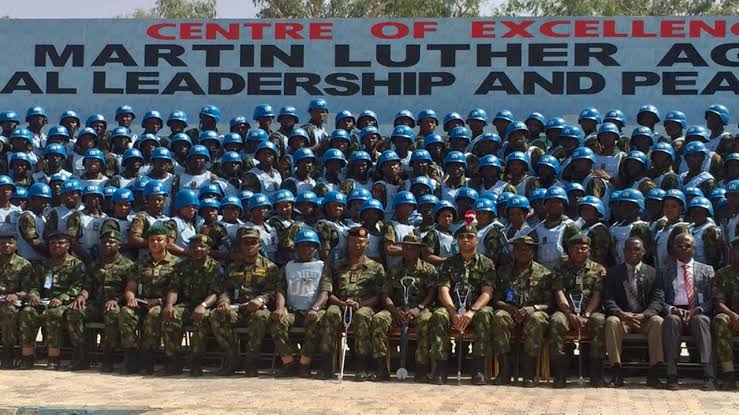Introduction
Nigeria’s role in African Union peacekeeping missions has been central to the continent’s security architecture since the early 2000s. As Africa’s most populous country and largest economy, Nigeria has positioned itself as a regional leader, providing troops, financial resources, and diplomatic leadership to conflict resolution initiatives. Its peacekeeping engagements illustrate the principle of “African solutions to African problems,” balancing national interests with continental obligations.
Historical Background and Policy Foundations

Nigeria’s peacekeeping history predates the AU. Since independence in 1960, the country has committed itself to pan-African solidarity, participating in the Congo peacekeeping mission under the United Nations (1960–1964) and later in regional interventions through the Economic Community of West African States Monitoring Group (ECOMOG) in Liberia and Sierra Leone during the 1990s (Adebajo, 2002).
The transformation of the Organisation of African Unity (OAU) into the AU in 2001 institutionalised a more interventionist peace and security framework. Unlike the OAU’s strict non-interference, the AU’s Constitutive Act (Article 4h) allows intervention in cases of genocide, war crimes, and crimes against humanity. Nigeria strongly supported this shift, recognising that instability in Africa directly affected its own national and economic security.
Major Contributions to AU Peacekeeping
Darfur – Sudan (2004–2007)
Nigeria played a leading role in the African Union Mission in Sudan (AMIS). Nigerian General Festus Okonkwo served as the first Force Commander, and Nigeria deployed around 1,500 troops. The mission faced severe resource constraints, but Nigeria’s participation demonstrated commitment to humanitarian protection and AU credibility.
When AMIS transitioned into the UN-AU Hybrid Mission in Darfur (UNAMID) in 2007, Nigeria continued its involvement. General Martin Luther Agwai became Force Commander (2007–2009), highlighting Nigeria’s military professionalism and leadership.
Somalia – AMISOM (2007–present)
Nigeria has contributed specialised units, including engineers, medical teams, and explosive ordnance disposal experts, to the African Union Mission in Somalia (AMISOM). While troop numbers were smaller compared to Uganda or Burundi, Nigeria’s financial and logistical contributions were significant.
EXPLORE NOW: Biographies & Cultural Icons of Nigeria
Mali – AFISMA (2013)
Following the crisis in northern Mali, Nigeria supported the African-led International Support Mission to Mali (AFISMA) by deploying troops, equipment, and funding. This effort later integrated into the UN mission MINUSMA, where Nigeria continued to play a role.
Côte d’Ivoire (2010–2011)
During the Ivorian post-election crisis, Nigeria, working through ECOWAS and the AU, contributed to mediation and supported the eventual installation of Alassane Ouattara, the democratically elected president.
Leadership and Institutional Development
Nigeria’s role has been shaped by influential figures:
- President Olusegun Obasanjo (1999–2007): Advocated for AU reforms and championed the Peace and Security Council, positioning Nigeria at the heart of AU security frameworks.
- General Martin Luther Agwai: His leadership of UNAMID underscored Nigeria’s operational credibility in complex peacekeeping missions.
- Ambassador Joy Ogwu: As Nigeria’s Permanent Representative to the UN, she pushed for sustainable African peacekeeping funding and women’s inclusion in peace processes.
Institutionally, Nigeria established training hubs like the National Defence College and the Armed Forces Command and Staff College, which train both Nigerian and African officers in peacekeeping operations.
Evolution of Nigeria’s Strategy
Nigeria’s peacekeeping approach evolved in three ways:
- Pan-Africanist Roots to Strategic Interests: While early involvement was ideologically driven, Nigeria increasingly linked peacekeeping to its security and economic interests.
- Inclusion of Gender Perspectives: The 2017 National Action Plan on Women, Peace, and Security aligned Nigerian peacekeeping with AU and UN gender policies, increasing female participation.
- Response to Emerging Threats: Nigeria recognised climate-induced insecurity and terrorism as continental challenges, applying its Boko Haram experience to AU and MNJTF counter-terrorism frameworks.
Challenges and Limitations
Despite its leading role, Nigeria has faced persistent challenges:
- Financial Constraints: Dependence on oil revenues has made contributions vulnerable to economic downturns.
- Domestic Security Crises: Boko Haram insurgency and communal conflicts have diverted attention and resources.
- Logistical and Capacity Issues: Limited equipment and specialised training sometimes weakened Nigeria’s ability to sustain long-term missions.
- Political Transitions: Shifts between administrations occasionally led to inconsistent resource allocations for AU operations.
Contemporary Relevance
Nigeria remains one of the AU’s strongest advocates for African-led security. Its contributions have strengthened AU institutional frameworks, including the Peace and Security Council and the African Standby Force. Moreover, Nigeria’s peacekeeping engagement has boosted its diplomatic standing, reinforcing claims to African leadership and securing recognition at the UN, where it has served multiple terms on the Security Council.
In the context of Sahel instability, Central African conflicts, and Somalia’s fragile recovery, Nigeria’s peacekeeping role remains critical. The country also seeks to shape AU responses to emerging security issues such as cyber threats and transnational organised crime.
Author’s Note
This article examines Nigeria’s peacekeeping role within the African Union, highlighting its historical foundations, military and diplomatic contributions, evolving strategies, and contemporary significance. While Nigeria faces challenges balancing domestic and regional priorities, its leadership remains central to the AU’s peace and security architecture.
References
- Adebajo, A. (2002). Building Peace in West Africa: Liberia, Sierra Leone, and Guinea-Bissau. Boulder: Lynne Rienner Publishers.
- African Union. (2001). Constitutive Act of the African Union. Addis Ababa: AU.
- United Nations. (2009). Report of the Secretary-General on the African Union-United Nations Hybrid Operation in Darfur. New York: UN.

